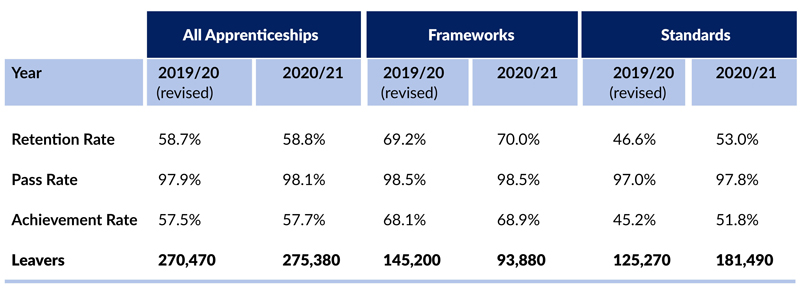Almost half of learners on the new-style apprenticeship standards failed to successfully complete their programme last year, new figures for 2020/21 reveal.
National achievement rate tables (NARTs) published this morning by the Department for Education show that the overall achievement rate for all apprenticeships increased slightly from 57.5 per cent in 2019/20 to 57.7 per cent in 2020/21.
The rate for 2019/20 has been revised downwards from 64.2 per cent which was calculated in “error” last year (click here full story here).
Today’s data shows that apprentices on old-style frameworks, which are being phased out, hit a 68.9 per cent achievement rate in 2020/21, but the new-style standards only achieved 51.8 per cent.
The revised achievement rate for standards in 2019/20 was actually just 45.2 per cent – compared to the 58.7 per cent originally stated.
The overall retention rate for all apprenticeships in 2020/21 was 58.8 per cent, which drops to 53 per cent when just looking at the retention rate for standards – meaning 47 per cent on standards dropped out.

Peter Mucklow, the DfE’s director of apprenticeships, warned last week’s FE Week Annual Apprenticeship Conference that his department would “not be satisfied with those levels” and pressed that “we need to get those achievement rates up”.
Responding to today’s figures, a DfE spokesperson said Covid-19 had a “big impact” on the rates but admitted “more needs to be done” to improve them going forward.
“Covid-19 had a big impact on achievement rates in 19/20 but even in normal years there are many reasons why people move on from apprenticeships, such as changes in family circumstances or promotion,” they said.
“We are pleased achievement rates have improved, but we know more needs to be done to ensure as many people as possible complete their apprenticeship when that’s right for them.”
The spokesperson added: “We have raised the bar to make apprenticeships more rigorous and we are also taking steps to drive up quality and ensure apprentices get a great experience. This includes more support for providers and employers and making sure prospective apprentices get the best possible information, advice, and guidance so they can make informed decision about their futures.”
Commentary published by the DfE alongside today’s data states that care are should be taken when comparing the rates with previous years “due to the effects of the pandemic”.
It said: “A number of things will have impacted the data. For example there was an increase in the number of breaks in learning which meant learners being reported in a different year to the one in which they were expected to complete. In 2018/19 only 6,000 learners were carried forward whereas 24,000 and 28,000 were carried forward in 2019/20 and 2020/21 respectively.”
The statisticians also say it is important to consider the “impact of programme change” in the nature of the provision resulting from the transition of frameworks to standards.
“Standards are designed to be more demanding than traditional frameworks,” they said.
“The assessment process is also more rigorous with a specific end point assessment phase following completion of training designed to ensure the apprentice is ready to do the job they have been trained for.”
In 2018/19 the proportion of learners on standards stood at 18.5 per cent whilst for 2019/20 the proportion had increased to 46.3 per cent. For 2020/21 the proportion has now reached 65.9 per cent.
















Your thoughts